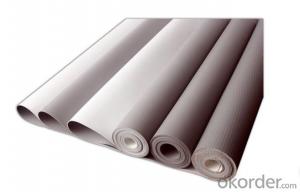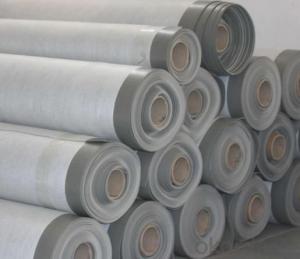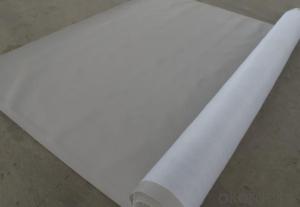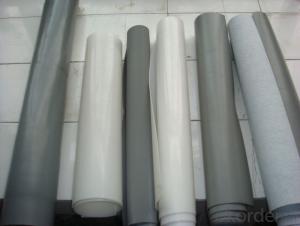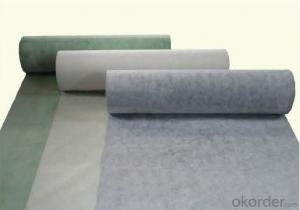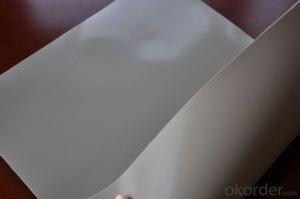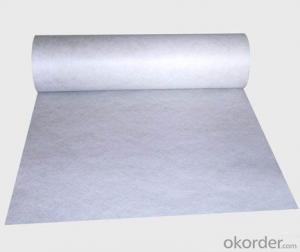PVC Waterproofing Membrane Reinforced Filter Rolls
- Loading Port:
- China main port
- Payment Terms:
- TT OR LC
- Min Order Qty:
- 5000 m²
- Supply Capability:
- 100000 m²/month
OKorder Service Pledge
OKorder Financial Service
You Might Also Like
Features of PVC Waterproofing Membrane:
Excellent anti-aging property.
Puncture- resistant.
Welding construction,
High tensile strength, good elongation, good dimensional stability.
Good plasticity.
It has self-extinguishing from fire property.
Materials surface is smooth, fast color, stain resistance.
More wide, Wastage become less when being used.
Specification of PVC Waterproofing Membrane:
Item | Specification |
Length | 20m |
Width | 1.05m, 2.05m,2.1m |
Thickness | 0.8mm,1.0mm;1.2mm;1.5mm;2.0mm |
Type of PVC Waterproofing Membrane:
N1—Exposed PVC waterproof membrane.
(It is mainly used as details treatment for exposed roof waterproof project)
N2—Non-exposed PVC waterproof membrane.
(It is mainly used as details treatment for non-exposed roof waterproof project)
L1—Exposed PVC waterproof membrane with fabric.
(It is mainly used for exposed roof waterproof project)
L2—Non-exposed PVC waterproof membrane with fabric.
(It is mainly used for non-exposed roof waterproof project)
W1—Exposed reinforced PVC waterproof membrane .
(It is mainly used for steel structure roof exposed waterproof project)
W2—Exposed reinforced PVC waterproof membrane .
(It is mainly used for steel structure roof non-exposed waterproof project)
Use scope of PVC Waterproofing Membrane:
-All kinds of roof .eg steel structure roof, planted roof and so on.
-Underground engineering, such as building basement, subways, tunnels, air Raid shelter, etc.
-Other projects like artificial lake , dam, water reservoir,, grain storehouse, etc.
FAQ of PVC Waterproofing Membrane
a.Can we get some samples before place order?
Answer: We can send the free samples to you by freight collect.
b.How many years can your PVC membrane guarantee?
Answer: We will guarantee the quality for 5 years at least.
c.Which countries you ever export the product?
Answer: We export the PVC membrane to South Africa, Middle east and even European countries.
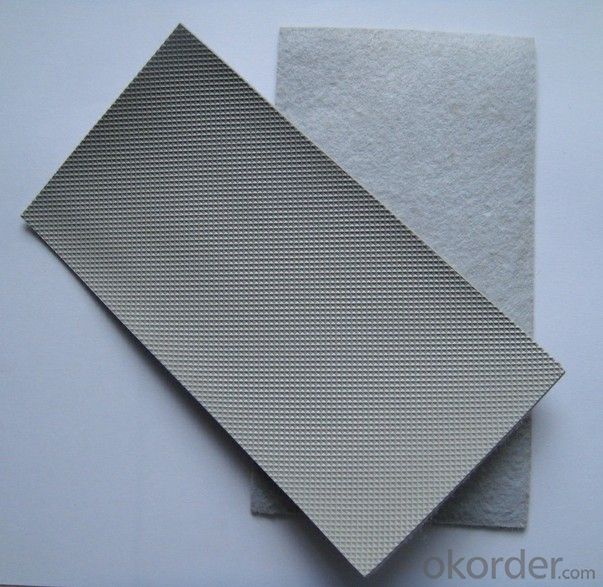
- Q: Can a waterproofing membrane be used in chemical or hazardous environments?
- Indeed, a waterproofing membrane proves effective in chemical or hazardous surroundings. Its purpose is to serve as a barrier against water, moisture, and other liquids, including chemicals and hazardous substances. Typically, these membranes are constructed from chemical-resistant materials like polyurethane, PVC, or modified bitumen. This composition ensures their durability and ability to withstand exposure to various chemicals without harm. Nevertheless, it is vital to choose a waterproofing membrane specifically designed for chemical or hazardous environments to guarantee compliance with necessary requirements and standards. Moreover, proper installation and maintenance play a crucial role in ensuring the long-lasting effectiveness of the waterproofing membrane in such settings.
- Q: Can waterproofing membranes be used on green roofs?
- Yes, waterproofing membranes can be used on green roofs. In fact, they are an essential component of green roof systems as they prevent water leakage and protect the underlying structure. Waterproofing membranes are specifically designed to withstand the unique challenges posed by green roofs, such as water infiltration and root penetration, ensuring the longevity and effectiveness of the green roof system.
- Q: Can a waterproofing membrane be used for wastewater treatment plants?
- Yes, a waterproofing membrane can be used for wastewater treatment plants. Wastewater treatment plants require effective waterproofing to prevent leakage and contamination of surrounding areas. A waterproofing membrane provides a protective barrier against water infiltration, ensuring the proper functioning and integrity of the treatment plant infrastructure.
- Q: Can a waterproofing membrane be used on foam block surfaces?
- Yes, a waterproofing membrane can be used on foam block surfaces. The membrane acts as a protective barrier, preventing water penetration and ensuring the foam blocks remain waterproof.
- Q: Can waterproofing membranes be applied on roofs?
- Yes, waterproofing membranes can be applied on roofs. These membranes are specifically designed to provide a protective layer against water infiltration and are commonly used in the construction industry to waterproof various types of roofs, including flat roofs, pitched roofs, and sloped roofs.
- Q: Can a waterproofing membrane be used for elevator pits and machine rooms?
- Yes, a waterproofing membrane can be used for elevator pits and machine rooms. Elevator pits and machine rooms are susceptible to water infiltration due to their location or proximity to underground water sources. This can lead to potential damage to the elevator machinery and electrical systems. To prevent water damage and ensure the longevity of the elevator system, it is crucial to apply a waterproofing membrane to these areas. A waterproofing membrane is a protective layer that is applied to the surface of a structure to prevent water penetration. It acts as a barrier against water and helps to keep the area dry and moisture-free. Waterproofing membranes are typically made of various materials such as bitumen, rubberized asphalt, or liquid-applied coatings. When applied to elevator pits and machine rooms, a waterproofing membrane provides an effective solution to prevent water seepage. It can be installed on the walls, floors, and even the ceiling of these areas to create a watertight seal. The membrane is resistant to water pressure, ensuring that no water enters the elevator pit or machine room. Moreover, waterproofing membranes also protect the elevator machinery and electrical systems from potential damage caused by water exposure. These systems are sensitive to moisture and can malfunction or corrode if exposed to water. By using a waterproofing membrane, the risk of such damage is significantly reduced, leading to improved reliability and longevity of the elevator system. In conclusion, a waterproofing membrane is a suitable solution for elevator pits and machine rooms as it effectively prevents water infiltration, protects the elevator machinery and electrical systems, and ensures the overall functionality and durability of the elevator system.
- Q: Can waterproofing membranes be used on swimming pool decks?
- Yes, waterproofing membranes can be used on swimming pool decks. Waterproofing membranes are designed to create a barrier against water penetration, making them an ideal solution for areas that are constantly exposed to water, such as swimming pool decks. By applying a waterproofing membrane to the deck surface, it helps to prevent any water from seeping through and causing damage to the underlying structure. Additionally, waterproofing membranes can also provide protection against chemicals, UV rays, and general wear and tear, which are common in swimming pool environments. Overall, using waterproofing membranes on swimming pool decks can help extend their lifespan, reduce maintenance costs, and enhance the overall safety and appearance of the area.
- Q: Can a waterproofing membrane be used for a foundation wall?
- A foundation wall can indeed utilize a waterproofing membrane. It is highly advisable to employ such a membrane to shield the foundation against water infiltration and moisture-related harm. Typically, this membrane is applied on the outer side of the foundation wall, serving as a barrier to prevent water from penetrating. Its design entails flexibility, durability, and resistance to hydrostatic pressure, thereby ensuring long-lasting protection for the foundation. Moreover, the membrane aids in preventing water from seeping into the basement or crawl space, thereby decreasing the risk of mold, mildew, and structural problems. Ultimately, employing a waterproofing membrane for a foundation wall is an effective means of safeguarding the building's foundation, guaranteeing its integrity and longevity.
- Q: Are there any environmental considerations when using a waterproofing membrane?
- Yes, there are several environmental considerations when using a waterproofing membrane. One of the main concerns is the potential for harmful chemicals or materials to be used in the production of the membrane. Some waterproofing membranes may contain toxic substances such as volatile organic compounds (VOCs) or heavy metals, which can have detrimental effects on human health and the environment. Another consideration is the disposal of the membrane once it reaches the end of its life cycle. Many waterproofing membranes are not biodegradable and can contribute to landfill waste. Improper disposal can lead to environmental pollution and harm to ecosystems. Additionally, the production of waterproofing membranes often requires energy-intensive processes and the extraction of non-renewable resources. This can contribute to greenhouse gas emissions and the depletion of natural resources. To mitigate these environmental concerns, it is important to choose waterproofing membranes that have been manufactured using eco-friendly materials and processes. Look for products that are labeled as low VOC or free from hazardous substances. Additionally, consider using membranes that are recyclable or made from recycled materials to reduce waste generation. Proper disposal of the membrane at the end of its life cycle is also crucial, and options such as recycling or repurposing should be explored. Overall, it is essential to consider the environmental impact of waterproofing membranes and choose products and practices that minimize harm to the environment and promote sustainability.
- Q: Can a waterproofing membrane be used in hospitals or healthcare facilities?
- Waterproofing membranes have the ability to be utilized in hospitals and healthcare facilities. In reality, it is highly advisable to employ waterproofing membranes in these settings as it is crucial to maintain a clean and hygienic environment. Typically, waterproofing membranes are applied on floors, walls, and ceilings to prohibit the infiltration of water or moisture. This infiltration can result in the growth of mold, the deterioration of building materials, and the compromise of the facility's structural integrity. By utilizing waterproofing membranes, healthcare facilities can effectively shield against water damage, facilitate easier cleaning and maintenance, and prevent the growth of harmful microorganisms and bacteria. Furthermore, waterproofing membranes can also assist in managing moisture levels, thereby reducing the risk of slips and falls. This reduction in risk is particularly vital in areas frequently visited by patients, staff, and visitors. Overall, waterproofing membranes are an invaluable asset in ensuring the safety, durability, and cleanliness of hospitals and healthcare facilities.
Send your message to us
PVC Waterproofing Membrane Reinforced Filter Rolls
- Loading Port:
- China main port
- Payment Terms:
- TT OR LC
- Min Order Qty:
- 5000 m²
- Supply Capability:
- 100000 m²/month
OKorder Service Pledge
OKorder Financial Service
Similar products
Hot products
Hot Searches
Related keywords
